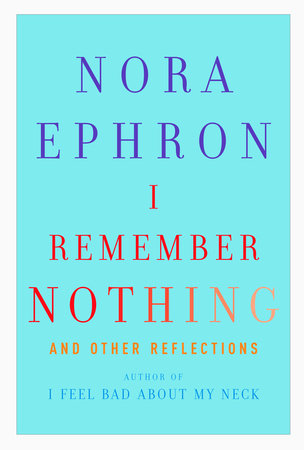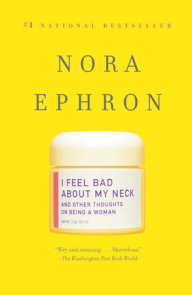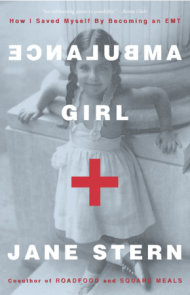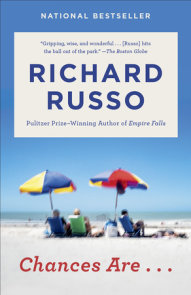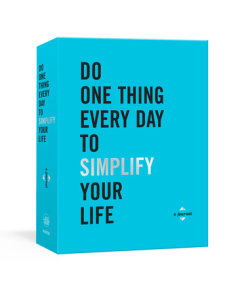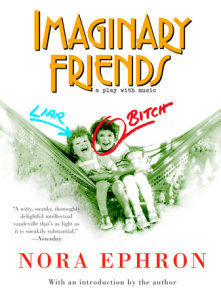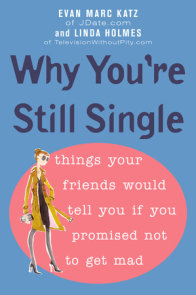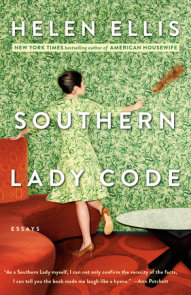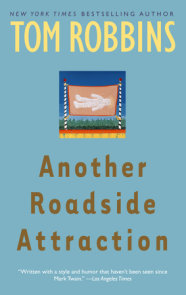READERS GUIDE
The questions, topics for discussion, and suggested books for further reading are designed to enhance your reading group’s discussion of I Remember Nothing.Introduction
In her newest collection of essays Nora Ephron, the author of the bestselling I Feel Bad about My Neck, offers inimitable reflections on life and love and loss. Exploring everything from the heady excitement of finding her true calling as a journalist to poignant memories of her mother, to the trials of aging and facing her own mortality, Ephron laces her observations with witty insights into our culture and into the fears, frustrations, joys, and regrets that life inevitably brings.Questions and Topics for Discussion
1. In the title essay, Ephron writes, “ . . . I have been forgetting things for years, but now I forget in a new way” [p.5]. How do the examples she uses capture the difference between her past and present ways of forgetting?
2. Does Ephron’s list of the symptoms of old age mirror your own experiences or things you have observed in older friends or relatives [p.6]? What other common signs of aging can you think of? How much of what we remember—or forget—is shaped by its relevance to our personal lives and history? What does Ephron’s inability to identify the celebrities in People magazine, for example, reflect about the different interests that naturally develop as we get older? How does this relate to Ephron’s list of what she “refuses to know anything about” [p. 10]?
3. Ephron writes about the start of her career as a writer in “Journalism: A Love Story.” Does the essay explain the rather unusual subtitle she has chosen? What does the atmosphere she encountered at Newsweek show about the times? How does Ephron respond to the limitations automatically imposed on her and the “institutionalism of sexism . . . at Newsweek” [p. 23]? To what extent do lucky breaks and useful connections play a role in the careers of most young people, including Ephron herself? How significant is her background—and her mother’s example—to Ephron’s confidence and drive?
4. “The Legend” offers a colorful portrait of Ephron’s childhood surrounded by Hollywood and literary celebrities, including her mother, a highly successful screenwriter, and the noted New Yorker writer, Lillian Ross. Discuss the various implications of the title. What does the anecdote at the heart of the essay, as well as the vignette about her graduation, convey about Ephron’s feelings for her mother? How does she capture the ambivalence experienced by a child of an alcoholic?
5. “My Life as an Heiress” provides more glimpses into the dynamics of Ephron’s family. How does she use humor and exaggeration to explore the relationships among her siblings—and the unexpected and less-than-admirable qualities triggered by the anticipation of an unexpected financial boon?
6. What does “Twenty-five Things People Have a Shocking Capacity to Be Surprised by Over and Over Again” reveal about human nature and our tendency to accept conventional beliefs despite lots of evidence to the contrary? What particular needs, emotions, or prejudices perpetuate our “capacity to be surprised”? Which entries resonated with you? What would you add to her list?
7. “Pentimento” chronicles the rise and fall of Ephron’s relationship with the controversial playwright Lillian Hellman. What qualities, personal and professional, initially make Hellman attractive to Ephron? What does Ephron’s description of their relationship— “‘Friends’ is probably not the right word—I became one of the young people in her life” [p.85]—convey about the way Hellman perceived herself and her importance in the literary community? Why does Ephron search for reasons to explain her ultimate rejection of Hellman [p. 89]? What do Ephron’s regrets show about how the passage of time alters our views of the infatuations and disappointments, as well as the missed opportunities, of the past?
8. “The Six Stages of E-Mail” is a very funny chronicle of Ephron’s evolving reactions to e-mail. Do you share her mixed feelings about e-mail and more recent (and, perhaps, more intrusive) technological advances like Facebook and other social networks? Have these new forms of communication made life easier or more complicated? To what extent have they become a less-than-satisfactory substitute for old-fashioned phone calls and face-to-face conversations?
9. In one of the most moving pieces in the collection, Ephron describes the traditional Christmas dinners she shared with friends for twenty-two years and the changes that occur when Ruthie, one of the participants, dies. How does the grief the others feel manifest itself? Discuss the repercussions of their attempts to move beyond (or compensate for) her absence, including its affect on the tone of their conversations as they plan the meal; Ephron’s resentment of losing her usual role of providing desserts; the group’s impatience and annoyance with the couple invited as replacements for Ruthie and her husband; and even the inclusion of Ruthie’s recipe for bread and butter pudding. What does “Christmas Dinner” reveal about the particular pain of losing friends as you get older?
10. Ephron turned her 1980s divorce from Carl Bernstein into the hilarious bestseller Heartburn. In “The D Word” she revisits that break-up and also recounts her divorce from her first husband in the 1970s. What do her accounts of each divorce illustrate about the issues she—and other women of her generation—faced? What light does she shed on the difficult challenges parents face when contemplating divorce [p. 120]? Which of her points do you find the most and the least convincing? She describes her second divorce as “the worse kind of divorce” [p. 123]. How do the details she offers provide a sense of the emotional toll of her husband’s deceptions and her reactions to them?
11. Ephron writes, “The realization that I may only have a few good years remaining has hit me with a real force . . . ” [p. 129]. How do her memories of her younger years inform her feelings of loss and how do they shape her approach to the years to come?
12. Several essays are entitled “I Just Want to Say” and go on to explore a specific topic. What do these pieces have in common? What do they and her short, funny, and to-the-point personal revelations like “My Aruba,” “Going to the Movies,” “Addicted to L-U-V,” and “My Life as a Meatloaf” contribute to the shape and impact of the collection?
13. Reread the lists (“What I Won’t Miss” and “What I Will Miss”) at the end of I Remember Nothing and create your own versions highlighting what you cherish—as well as you’d gladly give up.
14. If you have read I Feel Bad about My Neck, what changes do you see in Ephron’s outlook and perceptions over the course of time between the two books?
(For a complete list of available reading group guides, and to sign up for the Reading Group Center enewsletter, visit www.readinggroupcenter.com.)









